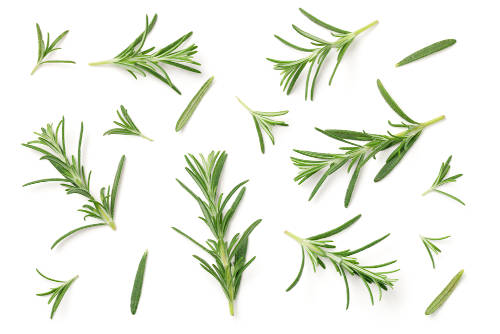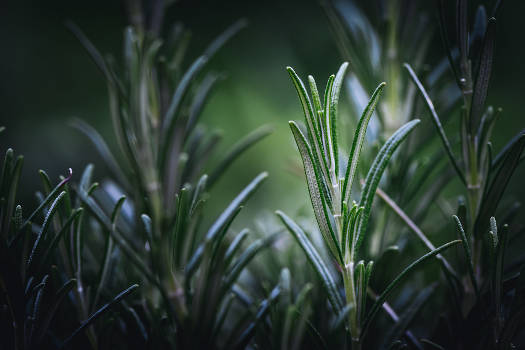Rosemary (Salvia rosmarinus) has a reputation for being the most versatile magical herb, and its medicinal and culinary uses are almost as varied.
Some witches even say that it can serve as a substitute for any other herb in a spell. While this isn’t entirely true, rosemary does have some wide-ranging properties that make it a worthwhile addition to any magical herb cabinet.
Magical Properties of Rosemary
Rosemary’s a woody perennial evergreen with needlelike leaves. These characteristics can tell you a surprising amount about its magical uses — protection, love, memory, and youth, among others. It’s considered one of the most important magical herbs of the Old World.
One of rosemary’s chief uses is as a cleansing and purifying herb. Burn the needles on charcoal or bind dried rosemary twigs into herb bundles to energetically clear spaces.
Another is as a love herb. It helps to keep relationships “evergreen,” and binds people together in a loving fashion.
The name “rosemary” comes from “rosmarinus,” meaning “dew of the sea.” It’s associated with the love goddesses Venus and Aphrodite. In medieval times, rosemary flowers were worn and carried at weddings.
Rosemary’s evergreen character lends it well to spells for remembrance, too. It’s used to enhance memory, and to remember the dead.

According to Roman lore, the scent of rosemary cheered the departed on their journey to the afterlife. The Egyptians used it in their burial rites. Rosemary is also a traditional European funeral herb for dressing corpses and laying on graves.
As a memory herb, rosemary is also used to preserve youth and beauty. Legend holds that Queen Isabella of Hungary, at over seventy years old, looked remarkably youthful. This was attributed to a potion made of orange blossoms and rosemary steeped in honey and sunflower oil.
The herb is considered a suitable substitute for other herbs for two reasons. For one, rosemary is highly adaptable, growing in a variety of conditions — even resisting cool climates, droughts, and salty sea spray. Second, it produces an aromatic resin when injured, which has been used in lieu of frankincense.
Frankincense, itself, is a very versatile magical herb that’s said to increase the power of any mixture to which it is added. Rosemary, as a substitute, gained the same reputation.
Rosemary is ruled by the Sun, though its associations with Venus and Aphrodite indicate Venus as well. Elementally, it’s a fire herb. Astrologically, it’s ruled by Leo.
See also: Check out Rosemary herbs and extracts here, and Rosemary essential oils here.
Benefits & Uses of Rosemary
Rosemary contains an antioxidant called carnosic acid. Research indicates that this acid can slow the growth of tumor cells. In addition to its antioxidant activity, carnosic acid is also antifungal, antibacterial, and antiviral.
In aromatherapy, rosemary is commonly used to reduce stress, enhance memory, and improve concentration.
It’s sometimes used for indigestion, and to help inflammation-related conditions like arthritis.
Possible Risks & Side Effects of Rosemary
As with any herb, allergies can happen. If you work with the essential oil, sensitization may occur. Allergies can appear as anything from a mild rash to full-blown anaphylaxis. If you are allergic to rosemary, substitute another herb.
Concentrated rosemary extracts and essential oil are potentially convulsant, and should be avoided by people with neurological disorders like epilepsy, Alzheimer’s, or Parkinson’s disease.
Consuming rosemary in large amounts may cause uterine bleeding, vomiting, kidney damage, and photosensitivity. Rosemary is safe when eaten in the amounts you’d normally use to season food.
Rosemary History & Folklore
The human use of rosemary goes back millennia — the first mention of the herb was on a cuneiform tablet dating back to 5000 BCE.
The Egyptians, Greeks, and Romans used it, and the Roman conquest may have brought the herb to England around the 1st century CE. It later became naturalized in China circa 220 CE.
In England, it was believed that rosemary wouldn’t grow in a garden if a woman didn’t rule the family. This is reflected in the old saying, “Where rosemary flourishes, the woman rules.”

Rosemary was commonly used to protect against disease. In France, it was a purifying herb for sickrooms. Doctors and nurses would blend it with juniper berries and burn it to clear the air.
At the height of the black plague, it was worn around the neck, stuffed into pomanders, and possibly even stuffed into the masks of plague doctors to provide protection against miasma.
Carrying a twig of rosemary was an old charm against the evil eye. It was also hung over cradles to keep infants from being stolen by faeries and switched for changelings.
Getting Started With Rosemary
Rosemary is one of the best herbs for a beginning witch. It’s safe, versatile, and smells delightful. Since it enhances memory, it’s also useful for those just embarking on an initiatory path — there’s a lot to learn and remember!
Place a sprig of rosemary under a pillow, or add it to a dream pillow, if you tend to forget your dreams. It’ll help you remember them.
If you’re in a situation where you want to make a lasting impression on someone, add rosemary leaves to your bathwater, wear a drop of its oil, or wear a sprig of its flowers. You’ll stick in their memory.
If you want to purify a ritual space, or would like to find a suitable substitute for white sage for smoke cleansing, burn rosemary needles.
You can also blend it with other herbs depending on your intent. Burn it with juniper to cleanse a home where there has been illness, garden sage to clear a ritual space, or rose petals before love magic.
Rosemary is easy to come by, and a very rewarding plant to grow yourself. If you have a sunny spot, give growing a rosemary bush a shot. You’ll have an endless supply of magical ingredients, and the opportunity to cultivate a special relationship with this beautiful, magical herb.
As an Amazon Associate, Terravara earns from qualifying purchases at no additional cost to readers.
